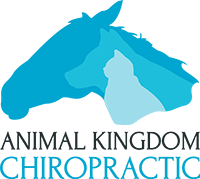Animal chiropractors address the VSC or Vertebral Subluxation Complex in animals. Today I’d like to invite you to learn about the VSC as it relates to horses and how this disturbance can affect the health and performance of your horses.
The VSC is a condition in the spine which can be a misalignment and/or limited mobility in the joints of the spine. When a subluxation exists, the normal flexibility of the spine can be affected. This can cause stiffness, muscular tension, and reduced mobility, which leads to interference in the nervous system. This interference can affect the flow of information from the brain to all parts of the horses body. Nerve fibers control body functions and muscle contraction. So every movement depends on the synchronization of many muscles. Lack of coordination can cause injury to other joints, tendons, and ligaments in the legs. A horse with subluxations will change its posture to compensate for the restricted mobility of its spine and to avoid pain. This causes mechanical strain on other parts of the spine and extremity joints, which causes secondary problems.
Here is a list of causes of VSCs:
- Trauma: falls, trips, slips, or being cast in the stable.
- Performance: different events can strain the spine in a specific way.
- Narcotics: general anesthetics can cause spine problems.
- Rider: crooked seat, or the rider is subluxated!
- Transportation: long trips, accidents, inadequate shock absorption in the trailer and poor driving skills can cause damage.
- Shoes: poor hoof care and bad shoeing interfere with the horse’s movement causing subluxations.
- Birthing Difficulties: foal is forcibly extracted, or it hits the ground hard.
- Saddle: poor fit is frequent cause of back problems.
- Lack of Movement: lack of space for proper movement and exercise restricts the horse the opportunity to ease tension by bucking or rolling.
- Age: increases effects of previous traumas to become more apparent.
